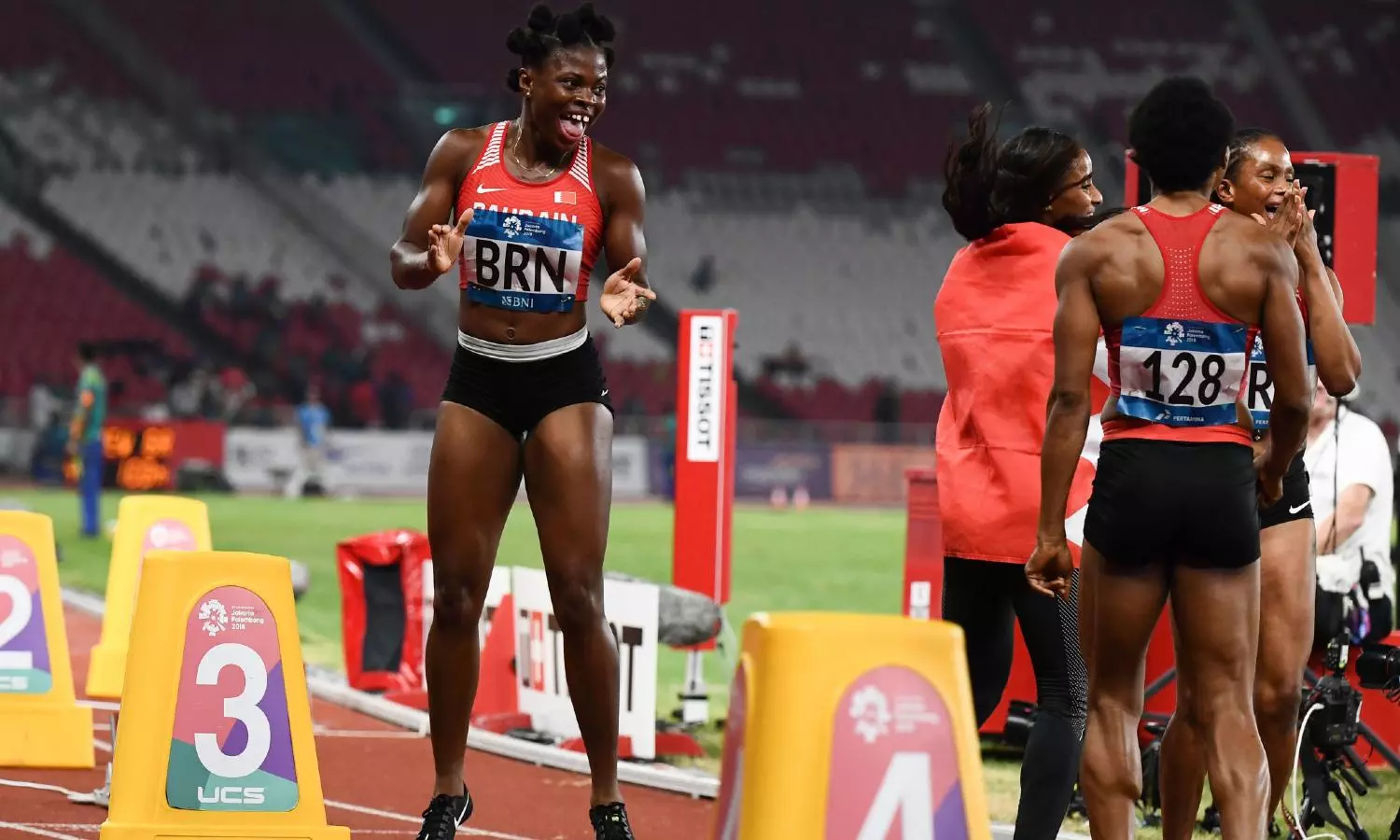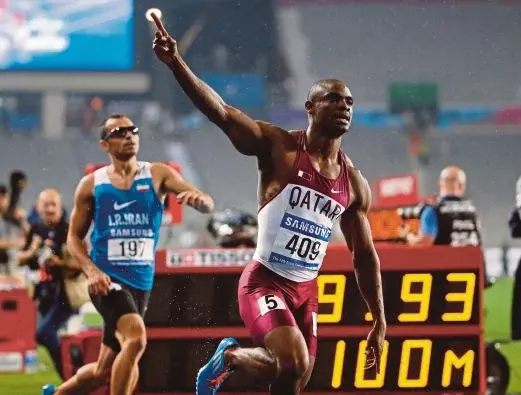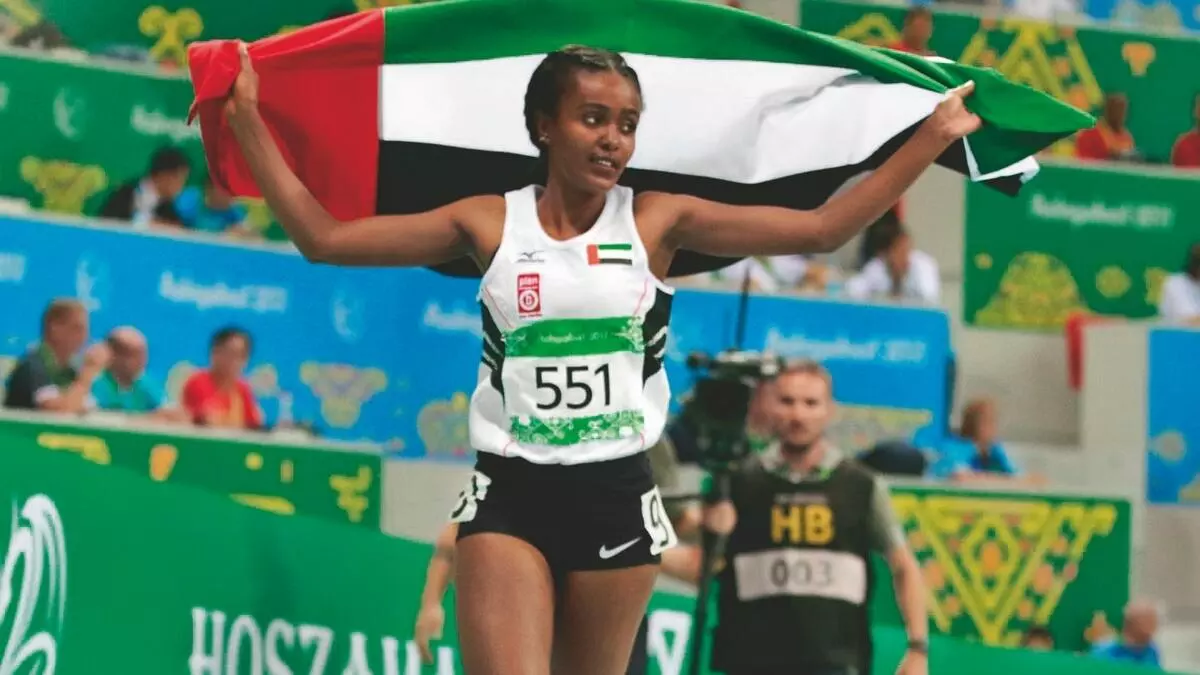Athletics
Are Gulf nations 'purchasing' Africans to dominate Asian Athletics?
With an increase in naturalised European and African origin athletes competing in Asian Athletics events, it has brought instant success for Gulf nations and heartbreak for others.

Naturalised athletes of Bahrain and other Gulf nations have established their dominance over Asian athletics since the 1990s. Here, Edidiong Odiong, the one who defeated Dutee Chand twice in 2018, celebrates. (File Photo/Getty)
Can success be bought? This is a common accusation levied at a few Gulf nations whose athletics contingent over the years, has moulded into one comprising African athletes instead of homegrown talent.
As the ongoing Asian Athletics Championships in Bangkok show, there are four 'entities' who win most of the athletics medals 'within Asia' these days - Japan, China, India, and... Africa!
With the 2022 Hangzhou Asian Games also around the corner, one has to ask the question – In essence, have Asian athletics events become the Afro-European Games?
Athletes of African descent have traditionally dominated the racing track. Simultaneously, Gulf nations athletes aren’t renowned for dominating athletics in international sporting events. Oil-rich gulf nations such as Qatar, Bahrain and the UAE grasped both these realities and utilized their financial prowess to reverse their fates overnight.
Seemingly having decided to stop developing their own, these countries ‘recruit’ talented athletes from Africa.
The attractive module of financial security, superior infrastructure and better quality of life is appealing for many. Eventually, many African athletes change their allegiance and nationality and compete at international events under a new flag of a gulf nation such as Bahrain, Qatar and Saudi Arabia. This practice has given rise to usage of the term - 'plastic athletes'.
There exists a conception that Asian bodies and international bodies need to act since this practice deprives Asian athletes an opportunity to triumph in their own continental competitions, which are pivotal in seeking qualifications for the Olympics. To worsen these woes, Russian and Belarus athletes are speculated to participate in the upcoming Hangzhou Asian Games.
The data does not lie - A rising trend since 1990s
Qatar was one of the first Gulf nations to indulge in this practice. Their first Olympic medallist was Somalia-born Mohamed Suleiman in the 1500m discipline at the 1992 Olympics.
This practice continues till date. Prior to the 2014 Rio Olympics, the IAFF received about 25 applications to switch allegiance on a single day. Gulf nations such as Bahrain and Qatar were at the epicenter at the majority of them. Between 2012 and 2016, Bahrain 'purchased' 18 athletes from Kenya, 17 from Ethiopia, 5 from Morocco and 2 from Nigeria.

An even more glaring example of this module’s success is the fact that all of Bahrain’s Olympic medalists in Athletics hail from Africa.
| Name | Country of Origin | Medal | Olympic Event |
| Rashid Ramzi - 2008* | Morocco | Gold | Men's 1500m |
Maryam Yusuf Jamal - 2012 | Ethiopia | Gold | Women's 1500m |
Ruth Jebet - 2016 | Kenya | Gold | Women's 3000m Steeplechase |
Eunice Jepkirui Kirwa - 2016 | Kenya | Silver | Women's Marathon |
Kalkidan Gezahegne - 2020 | Ethiopia | Silver | Women's 10,000m |
Table 1.0: List of Bahrain Olympics medallists. [Note* - Ramzi stripped off medal due to doping violation]
Bahrain spoils India's destiny with glory
The participation of African athletes under Gulf nation banners pointedly compromises the success of Indian athletes sometimes.
Bahrain clinched 12 gold medals at the 2018 Jakarta Asian Games and finished at the top of the medal tally list. The individual medalists hailed from Nigeria, Ethiopia, Kenya and Morocco.
But on eight such instances, Bahrain’s gold came at the cost of India’s shot at glory. In these eight instances, Indian athletes had to settle for silver.
| Event | Winner | Winner Origin | Silver Medallist |
| Men's 400m | Abdalelah Hassan | Qatar (Sudan) | Muhammed Yahiya |
| Men's 400m Hurdles | Abderrahman Samba | Qatar (Mauritania) | Dharun Ayyasamy |
| Women's 100m | Edidiong Odiong | Bahrain (Nigeria) | Dutee Chand |
| Women's 200m | Edidiong Odiong | Bahrain (Nigeria) | Dutee Chand |
| Women's 400m | Salwa Naser | Bahrain (Nigeria) | Hima Das |
| Women's steeplechase | Winfred Yavi | Bahrain (Kenya) | Sudha Singh |
Figure 2.0: Instances at the 2018 Asian Games where Gulf nation athletes of African origin side-lined Indian athletes to win gold.
It was the same story with 4x400m men and mixed relays, where the all but two members of the gold medal winning Qatar and Bahrain team were of African origin. India had to settle for silver in both instances.
Manufactured success?
If we take a closer look at the Asian Games track-record of Bahrain and Qatar, it reiterates the rise in success due to a rise in African-origin athletes competing for them.
| Asian Games Edition | Gold Medals | Total Medals |
| 1974 | 0 | 0 |
| 1978 | 0 | 0 |
| 1982 | 0 | 1 |
| 1986 | 1 | 2 |
| 1990 | 0 | 0 |
| 1994 | 0 | 0 |
| 1998 | 0 | 0 |
| 2002 | 3 | 7 |
| 2006 | 7 | 20 |
| 2010 | 5 | 9 |
| 2014 | 9 | 19 |
| 2018 | 12 | 26 |
Figure 3.0: Bahrain's Asian Games medal list shows a significant increase in medals won (especially, gold) at the turn of the century. This overlaps with the time period in which the gulf nation started to invest in naturalised athletes.
| Asian Games Edition | Gold Medals | Total Medals |
| 1978 | 0 | 0 |
| 1982 | 0 | 1 |
| 1986 | 1 | 4 |
| 1990 | 3 | 6 |
| 1994 | 4 | 10 |
| 1998 | 2 | 8 |
| 2002 | 4 | 17 |
| 2006 | 9 | 32 |
| 2010 | 4 | 15 |
| 2014 | 10 | 14 |
| 2018 | 6 | 13 |
Figure 4.0: Qatar's Asian Games medal tally depicts that the nation never crossed over to double-digits in a single edition till 1990. Ever-since 1990, Qatar has failed to reach a double-digit medal tally only once in almost three decades. Qatar was the first amidst the gulf nations to employ the strategy of naturalised athletes in the 1990s.
Not just limited to the tracks
A similar tactic is employed by Gulf nations to recruit European powerhouses to dominate weightlifting events.
Qatar ‘bought’ eight Bulgarian weightlifters prior to the 2000 Sydney Olympics. Eventually, Angel Popov (competing under the new name of Said Saif Asaad) brought back Qatar’s second Olympic medal after winning the bronze in Sydney. Asaad would go on to clinch gold at the 2002 Asian Games.
Interestingly enough, Tokyo Olympics weightlifts gold-medallist and Qatar’s first Olympic gold medallist Fares El-Bakh’s (Meso Hassona) father was also an Olympic weightlifter but for his native Egypt.
A New Beginning, a New Identity
A sprinter named Emre Zafer Barnes competed for Turkey in the 100m heats in Tokyo Olympics. But just six years prior, he was a Jamaican named Winston Barnes.
In order to blend in easily, the athletes commonly change their names to sound more Arabic.
There was even an instance when Kenya-born Stephan Cherono had to look up at the scoreboard to remember his new Qatari identity ‘Saif Saaeed Shaheen’ when he was on the podium after placing first in 3000m steeplechase at the 2003 Paris World Athletics Championship.
But Shaheen’s glory came at a cost. The athlete’s own brother, Abraham Cherono who finished fifth in the same race for Kenya, refused to congratulate a brother and fellow countryman who shifted allegiance.
A Different Lens
Bahrain and those alike have consistently re-iterated how they are following the letter of the law. There are laws in place to permit athletes to change their nationalities and these nations are perhaps exploiting this rule but certainly not violating it.
Additionally, the leeway to change one’s allegiance helps numerous athletes to follow their dream. The talent depth is so intense in nations such Ethiopia, Jamaica and Nigeria that some athletes would never have the opportunity to showcase their talents if it wasn’t for a country like Qatar.
Since there is easier competition in a nation like Bahrain and Qatar, it is comparatively easier for an athlete from Africa to break through the ranks here.

Qatar doesn’t perceive this practice as simply importing established African athletes. Instead, it’s a process that includes negotiating with their athlete’s family, providing world-class training and elevating them to a level of a world champion.
There have been some reports of alleged mismanagement, non-fulfilment but there have also been stories of athletes who are seeking a better life, better living conditions, a shot at glory and are proud to represent the Gulf nations.
Furthermore, these Gulf nations aren’t the only one with naturalised athletes. Turkey, Azerbaijan, France and many more countries often encourage the shift of allegiance of athletes.
Some also perceive the participation of African-origin and European-origin athletes in Asian events as a positive since it elevates the level of competition and pushes Asian athletes to improve even further.
